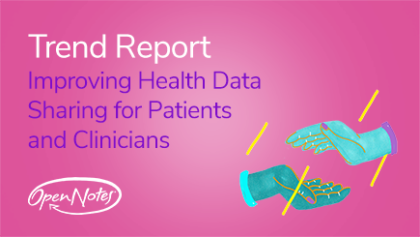
Here are a few pieces about improving health data sharing for patients and clinicians that have piqued our interest recently:
The Limits of Health Data Aggregation: Why our health records don’t tell our whole stories
Patient advocate Katie McCurdy pens a powerful essay for Medium on how “large swaths of our human existence are not captured in our medical records.”
Apple Is Going After The Healthcare Industry, Starting With Personal Health Data
A detailed look at Apple’s plans to take over healthcare. “The market opportunity in healthcare is huge, and Apple sees healthcare and wellness as a core part of its app, services, and wearables strategies. Now the company is aiming to become your personal health record, jumping into research, medical devices, and more.”
3 Ways to Make Electronic Health Records Less Time-Consuming for Physicians
Can we blame electronic health records for physician burnout? Read what three thought leaders share in this Harvard Business Review article.
A CMS Initiative: Patients Over Paperwork
Something to keep an eye on: Through its “Patients over Paperwork” initiative, the Centers for Medicare & Medicaid Services (CMS) hopes to reduce unnecessary burden, increase efficiencies, and improve the beneficiary experience by removing regulatory obstacles that get in the way of providers spending time with patients.
“In response to the Health and Human Services (HHS) request for information on updating HIPAA, AMIA and AHIMA say HIPAA creates challenges with data exchange and can be misused to restrict access.”
The Office of the National Coordinator publishes proposed rules, includes clinical notes
ONC proposes new US Core Data for Interoperability standards. New elements to the USCDI include: 1) consultation notes, 2) discharge summary, 3) history and physical, 4) imaging narrative, 5) lab report narrative, 6) pathology report narrative, 7) procedure note, and 8) progress note.



